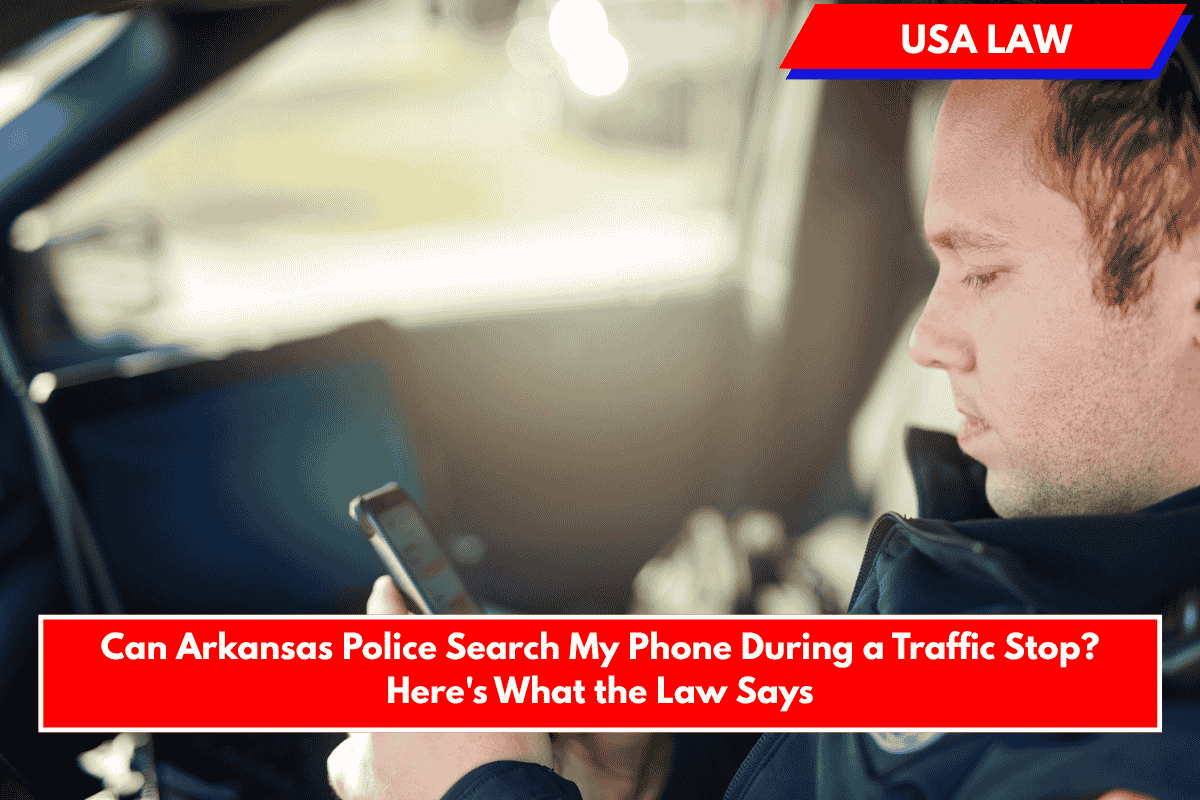Arkansas drivers often wonder about their rights when it comes to police searching their cell phones during a traffic stop. The answer is rooted in both the U.S. Constitution and Arkansas law, and recent court decisions have made the rules clearer than ever. Here’s what you need to know.
Your Rights Under the Fourth Amendment
The Fourth Amendment to the U.S. Constitution protects you from “unreasonable searches and seizures.” This means police generally cannot search your person, car, or belongings—including your cell phone—without a warrant or your consent. Arkansas’s own constitution offers similar protections, sometimes interpreted even more strictly by state courts.
Traffic Stops: What Police Can and Cannot Do
- Routine Requests: During a traffic stop, police can ask for your driver’s license, registration, and proof of insurance. You are required to provide these documents.
- Search of Your Car: Police cannot search your car without your consent unless they have probable cause (a reasonable belief that evidence of a crime is present) or another legal exception applies.
- Search of Your Phone: Your cell phone is considered highly private. Police cannot search your phone just because you’ve been pulled over. They may ask to see your phone, but you have the right to politely refuse.
When Can Police Search Your Phone?
| Scenario | Can Police Search Your Phone? | Explanation |
|---|---|---|
| You Consent | Yes | If you hand over your phone or unlock it for police, you’ve given consent, and they may search it fully. |
| Probable Cause & Warrant | Yes | If police have probable cause, they can seize your phone and seek a warrant to search its contents. A judge must approve the warrant, specifying what can be searched. |
| No Consent, No Warrant | No | Without your consent or a warrant, police cannot search your phone during a routine traffic stop. |
| Incident to Arrest | Limited | If you are lawfully arrested, police may seize your phone. However, under the Supreme Court’s decision in Riley v. California (2014), they still need a warrant to search its contents—except in rare, urgent circumstances. |
Important Exceptions and Details
- Consent: If you voluntarily give your phone to police or unlock it for them, you have waived your right to privacy for that search. Anything found can be used as evidence.
- Probable Cause: If police see evidence of a crime in plain view or have strong reason to believe your phone contains evidence, they can seize it and hold it until they get a warrant.
- Incident to Arrest: Even if you’re arrested, police cannot search your phone’s contents without a warrant. They can, however, secure the phone to prevent destruction of evidence while awaiting a warrant.
What Should You Do If Asked to Hand Over Your Phone?
- Politely Decline: You have the right to refuse a search of your phone. Clearly state, “I do not consent to a search of my phone.” Do not physically resist, but do not unlock or hand over your device.
- Do Not Provide Passwords: Police cannot force you to provide your password or unlock your phone without a warrant. Under current law, they also cannot compel you to use your fingerprint or face to unlock your device unless a warrant specifically authorizes it.
- Ask to See a Warrant: If police claim they have a warrant, ask to see it. A valid warrant must be signed by a judge and specify what is to be searched and seized.
If Your Rights Are Violated
If police search your phone without your consent or a warrant, any evidence they find may be inadmissible in court. You should contact an attorney to challenge the search and protect your rights.
Arkansas Police and Phone Searches
| Situation | Can Police Search Your Phone? | Your Rights |
|---|---|---|
| Routine traffic stop, no consent | No | You may refuse; do not hand over or unlock your phone. |
| You give consent | Yes | Anything found can be used as evidence. |
| Probable cause, no warrant | No (but phone may be seized) | Police must get a warrant to search contents. |
| Incident to arrest | No (search requires warrant) | Police can seize phone, but need warrant to search contents. |
In Arkansas, police cannot search your phone during a traffic stop unless you give consent or they obtain a warrant based on probable cause. Even if you are arrested, a warrant is generally required to search your phone’s contents. Always exercise your right to refuse consent and ask to see a warrant if police want to search your phone.
Sources
- https://www.acluarkansas.org/sites/default/files/field_documents/237_0.pdf
- https://www.davidyannetti.com/articles/do-i-have-to-give-police-access-to-my-phone-during-a-traffic-stop/
- https://leb.fbi.gov/articles/legal-digest/legal-digest-searches-incident-to-arrest-in-the-smartphone-age
- https://www.koffellaw.com/blog/search-and-seizure-of-cell-phones-by-law-enforce/
- https://digitalcommons.wcl.american.edu/cgi/viewcontent.cgi?article=1044&context=clb











